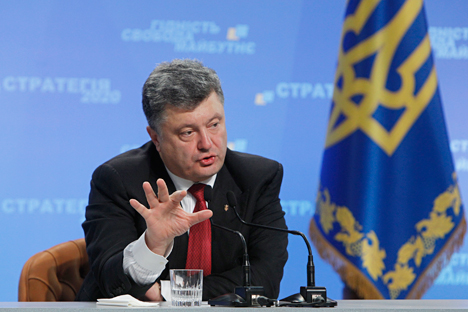
Ukrainian President Petro Poroshenko. Source: Reuters
Business daily Kommersant writes that Ukraine’s leadership is intensifying its contacts with the United States and the EU, trying to prove its commitment to reforms – delegations from the U.S. Congress and the EU leadership will be visiting Kiev this week.
The newspaper notes that the delegation from the U.S. Congress will come to Ukraine less than two months after Secretary of State John Kerry’s trip, in which he assured Ukrainian leadership that Washington would give Kiev a $1 billion loan “if reforms continue to be implemented.” Now, U.S. lawmakers will examine how reality corresponds with the Americans’ expectations, writes Kommersant. In addition, members of the delegation will discuss the possibility of supplying Kiev with American lethal weapons.
The newspaper notes that on the eve of the Washington delegation’s visit, President Poroshenko earned valuable points in the eyes of the West, coming out the winner in a confrontation with Dnepropetrovsk oligarch Ihor Kolomoisky. The resignation of the latter has allowed the president’s camp to claim that this was the starting point of the “de-oligarchization” of the country.
Forecasts that the scandal surrounding Ihor Kolomoisky would lead to a quarrel among ruling elites, whip up a growth in separatist sentiment in the east of the country, and increase the threat of Ukraine’s disintegration, also failed to materialize, writes Kommersant.
At their latest summit in Egypt, the League of Arab States (LAS) has decided to establish a unified regional armed forces, writes centrist daily Nezavisimaya Gazeta. The publication notes that the fighting in Yemen is leading to the destabilization of the Middle East, initially triggered by the Arab Spring. According to Nezavisimaya Gazeta, the current civil war could very well develop into a direct conflict between regional rivals Saudi Arabia and Iran. The publication explains that the group that prevails in Yemen will be in a position to control one of the most important oil shipping routes in the world.
Nezavisimaya Gazeta tells us that this is the reason behind the Arab League’s decision to establish a regional armed forces. The combined forces will be formed on a voluntary basis, and will not be under the control of any single country.
In an interview with Nezavisimaya Gazeta, Veniamin Popov, Director of the Center for Partnership of Civilizations (Moscow State University of Foreign Affairs, MFA) said that the escalation of this conflict is playing into the hands of the Americans – they are no longer dependent on oil supplies from the Middle East, but the EU and China continue to depend on this region.
The weekly business magazine Expert is following the renewed negotiations on the Iranian nuclear program now taking place in Lausanne, Switzerland. The publication reports that the situation is tense, and for now, the parties have agreed on only one thing – that there has been progress made at the negotiating table. However, Expert notes that only a day remains before a comprehensive agreement is signed.
The fact that progress has really been made in Lausanne can be judged by the circumstantial evidence, says the publication. On the eve of the signing of the document, oil prices dropped and there was talk of removal of sanctions against Iran, while the main opponent of this agreement, Israeli Prime Minister Benjamin Netanyahu, once again called the agreement “a mistake.”
Expert notes that the negotiators themselves are cautious, not making any promises that a preliminary agreement on Iran’s nuclear program will be signed by the evening of March 31. The publication reminds its readers that the parties are discussing compromises on the main contentious issues – the number of centrifuges and the volume of enriched uranium for medical purposes that Iran may possess. Another controversial issue, on which they have failed to find a compromise solution so far, is the rate of removal of sanctions against Iran, should an agreement be signed. The West is offering a phased-in removal of sanctions over a period of4-6 years, while Iran insists on their immediate removal.
All rights reserved by Rossiyskaya Gazeta.
Subscribe
to our newsletter!
Get the week's best stories straight to your inbox